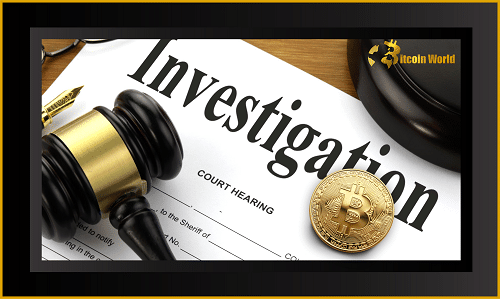Are you concerned about the rising tide of scams in the cryptocurrency world? You’re not alone. A US House subcommittee is demanding answers and action from regulators and exchanges to combat the widespread fraud plaguing the crypto industry. Here’s what you need to know.
US House Committee Demands Action on Crypto Scams
On August 30th, the Subcommittee on Economic and Consumer Policy of the US House Oversight Committee intensified its scrutiny of cryptocurrency fraud. Headed by Congressman Raja Krishnamoorthi, the committee is pressing for concrete solutions to protect investors.
Letters were sent to key figures and organizations, including:
- Treasury Secretary Janet Yellen
- Federal Trade Commission Chair Lina Khan
- Securities and Exchange Commission Chair Gary Gensler
- Commodity Futures Trading Commission Rostin Behnam
- Major crypto exchanges: Coinbase, FTX, Binance.US, Kraken, and KuCoin
The letters demand explanations of the measures being taken to combat the rampant fraud and scams within the cryptocurrency ecosystem.
Congressman Krishnamoorthi stated, “As stories of skyrocketing prices and overnight riches have attracted both professional and amateur investors to cryptocurrencies, scammers have cashed in.”
He further emphasized the vulnerabilities inherent in the crypto space:
- Lack of central authority to flag suspicious transactions
- Irreversibility of transactions
- Limited understanding of the technology among consumers and investors
These factors combine to make cryptocurrency a preferred method for scammers.
Congressman Says “We Need to Regulate Cryptocurrency Abuse, Fraud, and Scams”
Despite the Federal Trade Commission (FTC) reporting over $1 billion in losses to cryptocurrency scams this year, the Congressman argues that the government’s progress in curbing these schemes has been insufficient. FTC data reveals that phony investment opportunities accounted for a staggering $575 million in crypto fraud losses in 2021.
Krishnamoorthi’s letters highlight the need for clarity and coordination among regulatory bodies. “Without clear definitions and guidance, agencies will continue their infighting and will be unable effectively to implement consumer and investor protections related to cryptocurrencies and the exchanges on which they are traded,” he wrote.
The Representative announced the action on Twitter, prompting responses from concerned Americans who have fallen victim to scams. A response is expected by September 12.
One Twitter user responded to Raja’s announcement by stating, “Cryptocurrency is a Ponzi scam and an environmental crime.”
What’s Next?
The demand for answers from regulators and exchanges signals a crucial turning point for cryptocurrency regulation in the US. As the September 12th deadline approaches, all eyes are on the responses from the involved parties. The outcome of this inquiry could lead to stricter regulations, increased consumer protection, and a more secure environment for cryptocurrency investors.
Protect Yourself from Crypto Scams
In the meantime, here are some steps you can take to protect yourself from cryptocurrency scams:
- Do your research: Understand the technology and the specific cryptocurrencies you’re investing in.
- Be wary of guarantees: Promises of high returns with little to no risk are red flags.
- Don’t rush: Scammers often pressure you to make quick decisions.
- Use secure wallets: Store your cryptocurrencies in secure wallets with strong passwords and two-factor authentication.
- Report scams: If you suspect a scam, report it to the FTC and other relevant authorities.
Conclusion
The US House Committee’s investigation into cryptocurrency scams underscores the urgent need for regulatory clarity and consumer protection in the rapidly evolving digital asset landscape. By staying informed and taking proactive steps to safeguard your investments, you can navigate the crypto world with greater confidence and security.
Disclaimer: The information provided is not trading advice, Bitcoinworld.co.in holds no liability for any investments made based on the information provided on this page. We strongly recommend independent research and/or consultation with a qualified professional before making any investment decisions.


